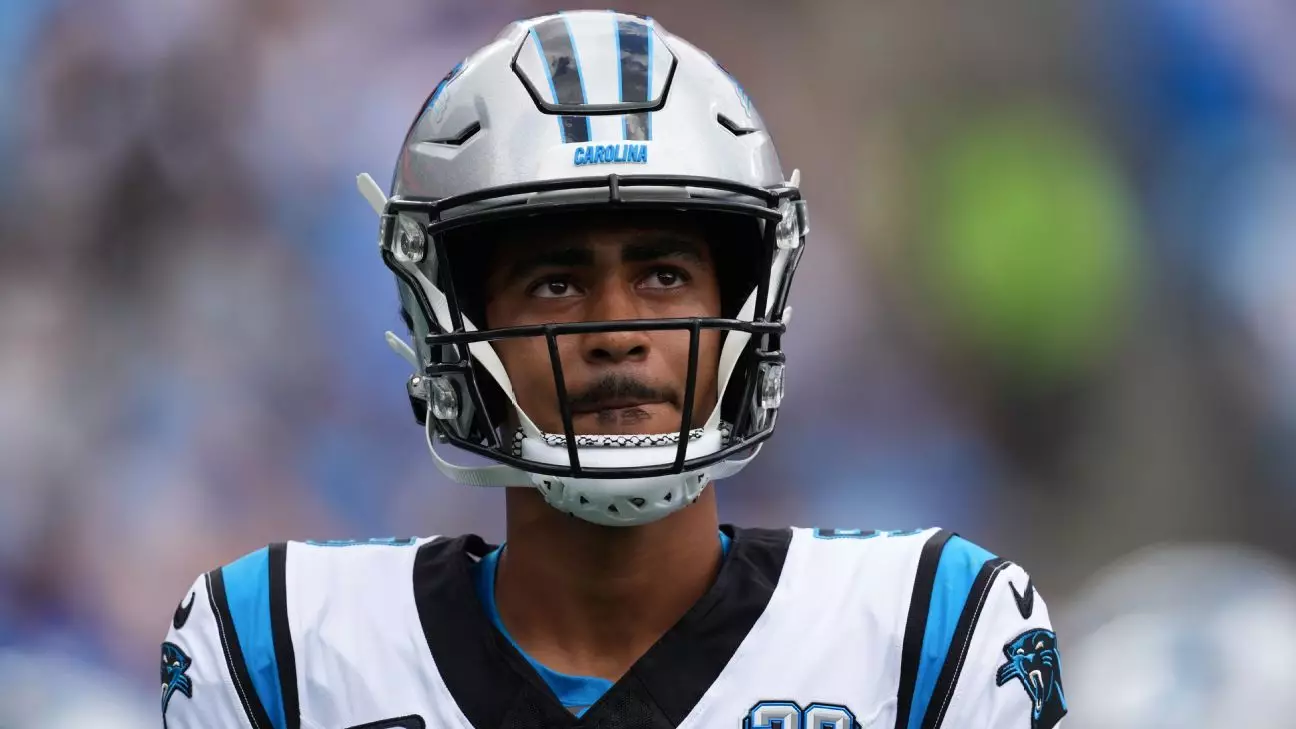The saga surrounding Bryce Young, the former No. 1 overall pick in the NFL draft, has taken a tumultuous turn. While the Carolina Panthers’ head coach, Dave Canales, publicly maintains that the team has no intentions of trading Young, a growing consensus among league sources suggests that a transaction may be imminent. Young’s performance as the starting quarterback has raised eyebrows, and the question lingering in the air is whether the Panthers will hold onto their prized asset or look to capitalize on potential trade opportunities in the coming offseason.
Bryce Young’s performance on the field has left much to be desired, with a mere two wins against sixteen losses as a starter, marking a historically poor record for a quarterback selected first overall. His struggles have led to discussions among various teams regarding a possible trade. While the Panthers expressed a desire to keep Young, the sentiment across the league indicates that teams are monitoring the situation closely. This duality highlights the precarious position Carolina finds itself in—clinging to potential rather than capitalizing on a growing market for quarterbacks.
Teams around the league have expressed interest in acquiring Young, yet whether Carolina is genuinely committed to retaining him remains to be seen. The Panthers’ reluctance to trade their former star signifies either a strong belief in his potential or an underestimation of the diminishing returns that come from ignoring trade inquiries. The organization seems divided between the hope of developing Young into the quarterback they envisioned and the pragmatic approach of leveraging his perceived trade value before it wanes further.
The landscape of the NFL has seen a notable trend in trading former first-round quarterbacks, often resulting in surprising outcomes and valuable returns. For instance, the Arizona Cardinals’ decision to ship Josh Rosen to the Miami Dolphins for a second-round pick illustrates how organizations recalibrate their priorities when a player does not meet expectations. Similarly, last offseason saw multiple high-profile trades involving first-round quarterbacks, albeit at considerably lower values than what was originally invested.
Comparing these scenarios to Young’s situation reveals a potentially troubling trajectory. The Panthers traded significant capital to acquire the No. 1 overall pick from the Bears last year, and trading Young now may result in a loss that the franchise might be unwilling to accept. Yet, with each lackluster performance, the allure of a trade diminishes. Thus, balancing Young’s developmental needs against the franchise’s aspirations becomes paramount.
From Young’s perspective, the transition to a backup role behind veteran Andy Dalton marks a critical juncture in his career. He expressed surprise at being benched, acknowledging the myriad of areas needing improvement. His teammates, including running back Miles Sanders and wide receiver Adam Thielen, have voiced support, emphasizing that despite the current struggles, Young possesses the talent and potential to excel. This camaraderie is essential in building a supportive environment for Young as he navigates the pressures of professional football.
As the Panthers continue their season, the performance of Dalton and the overall progress of the team will undoubtedly factor into the decision-making process surrounding Young. If Dalton can succeed in leading the offense effectively, it might provide the Panthers greater leeway to consider their options with Young as they look to reshape their future.
The narrative surrounding Young is still being written, and while the present may appear grim, it is essential to recognize that many quarterbacks take time to develop fully. The key question remains: will the Carolina Panthers be patient enough to see it through, or will the excitement of potential trades override the commitment to developing their young talent? As offseason trade rumors begin to swirl, the fate of Bryce Young could very well hinge on the next few months of play.


Leave a Reply